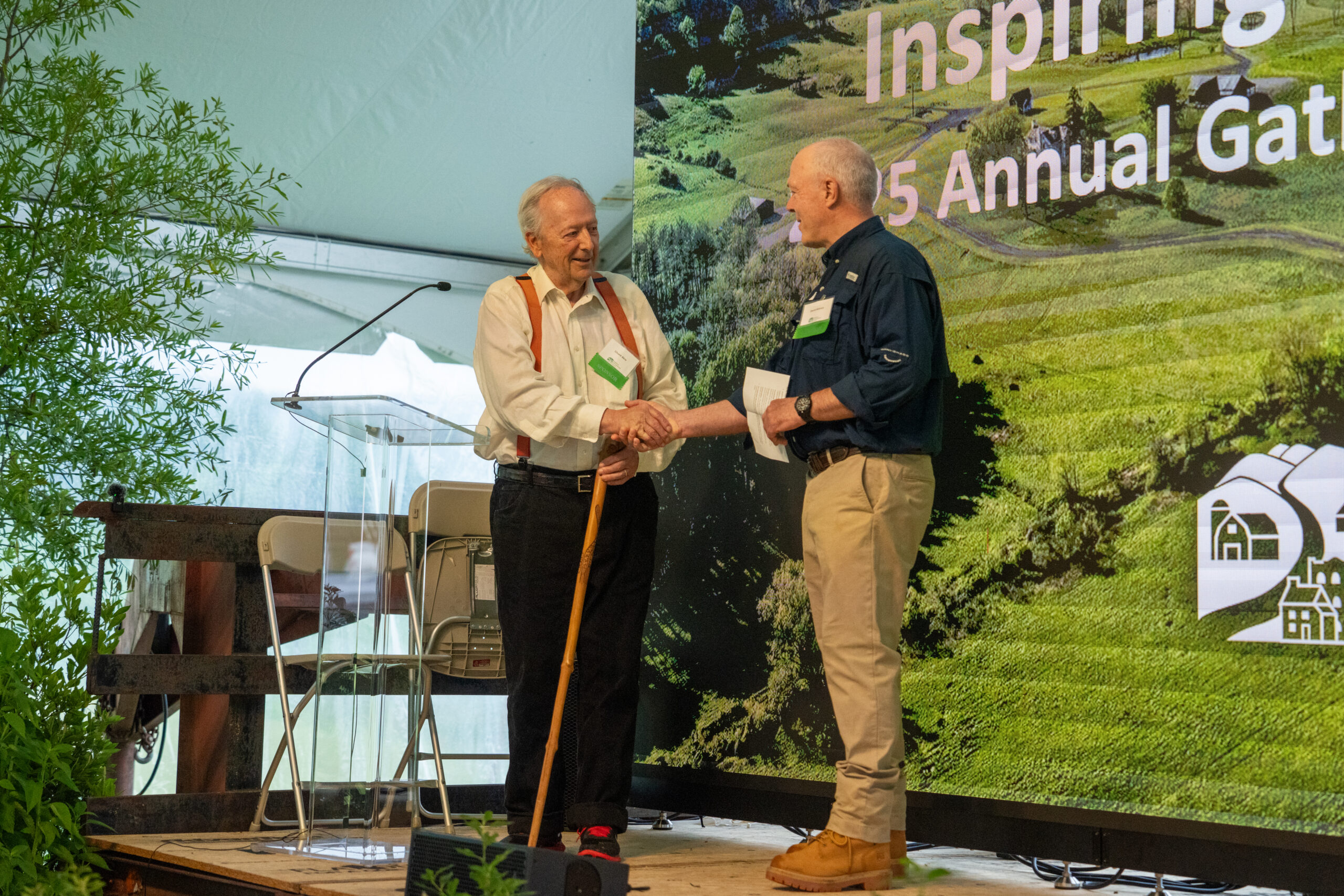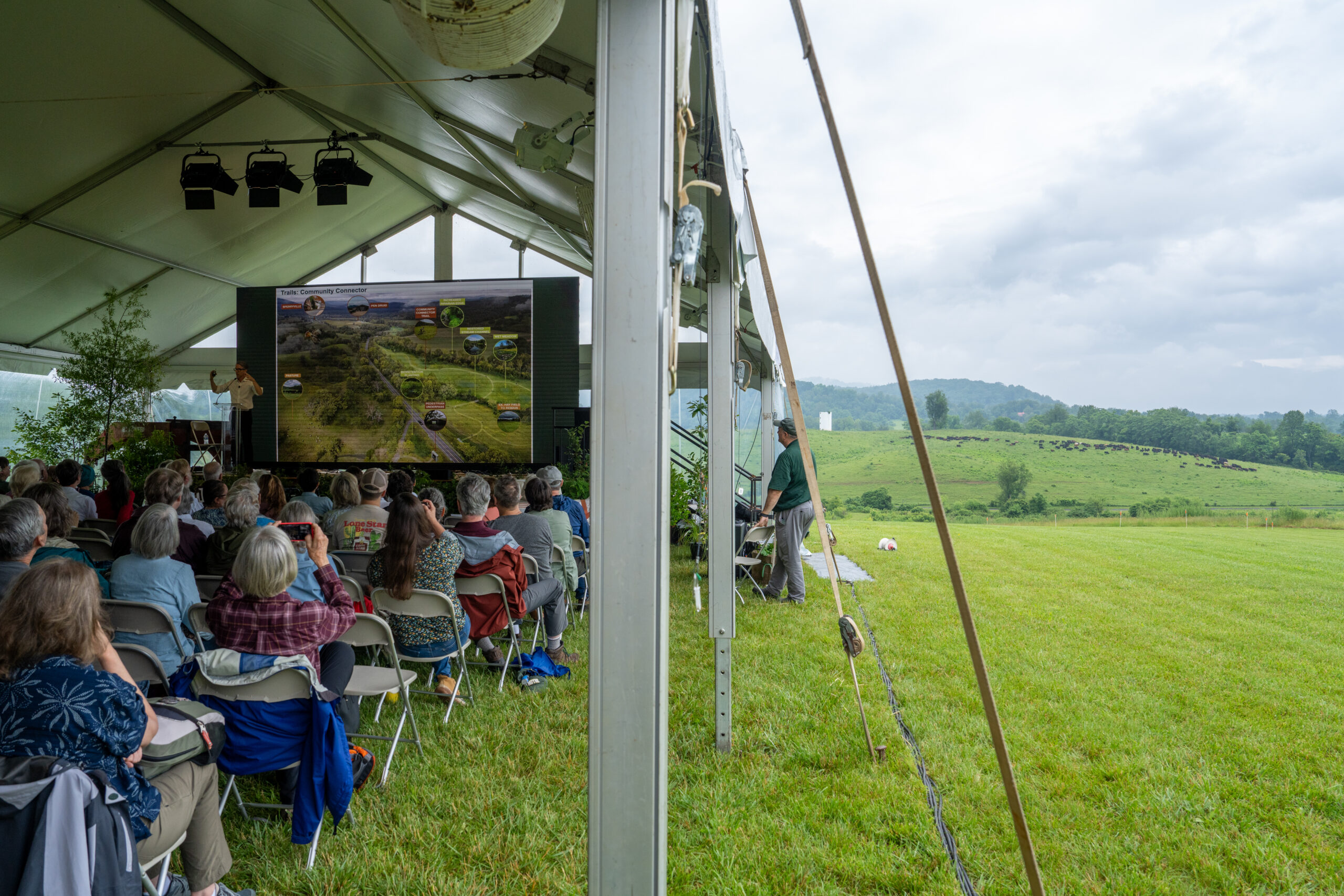7,100-acre reserve welcomes hikers, farmers, scientists, neighbors
The 7,100 acres of Eldon Farms in Woodville have entered a new era, poised to become a public-private reserve that will mix ecological restoration, education, recreation and advanced farming and grazing practices.
Hikers, scientists, farmers and neighbors will be welcome to explore Eldon’s mix of meadows, forests and waterways. According to a master plan, “the project will serve as an economic engine for the local economy.”
The ambitious vision, unveiled last Sunday at the Piedmont Environmental Council’s (PEC) annual gathering, follows three years of inventory-taking, analysis and transformative design work led by Nelson Byrd Woltz Landscape Architects, an internationally-acclaimed firm specializing in restructuring and renewing entire landscapes.
As keynote speaker at the gathering, Thomas Woltz, owner and senior principal of the firm, first honored Washington resident Chuck Akre and his family, who bought the enormous expanse in 2021 from the Chicago-based Lane family, which had created Eldon by aggregating dozens of smaller farms.
Before the Akre purchase, the fate of Eldon Farms worried some Rappahannock residents, who feared the permanent loss of an exceptional landscape to haphazard development. The late Bill Dietel, a much-loved philanthropist and force for change in the county, urged Akre to make an offer. The successful wealth management executive hesitated initially, but eventually acquired Eldon for $27.6 million, according to court records, significantly below the $75 million asking price posted two years earlier. With the acquisition, Eldon Farms was protected from developers but its future remained suspended in mystery, with Akre stating only that it would be a “conservation purchase.”
In 2022, Akre engaged Nelson Byrd Woltz, which then assembled a team of ecological and agricultural experts to begin work on a master plan that Woltz outlined Sunday.

Attendees watching a presentation of plans for the farm’s future. (Photo/Courtesy)
Understanding the land
Discussing his conservation philosophy, Woltz came across as both soulful and diligent, touching on everything from ecological biology to the varied histories of human uses, and misuses, of land.
His vision for Eldon Farms is multifaceted, and more nuanced than simply pushing all 7,100 acres into conservation easement to prevent development. The current plan envisions neighbors and visitors walking newly-cut trails and scientists collaborating at research stations, with cows grazing nearby. Researchers will gather data on insects and plants, as well as cultural and economic history. The diverse components will form an integrated understanding of the land, its past and its future.
“This is a plan that puts all the pieces on an equal footing,” said Rappahannock resident John Beardsley, an author and curator, with established expertise in landscape architecture. “Culture and community development, soil conservation, productive agriculture, biodiversity — all those pieces are treated equally,” he said.
Experts in the field have emphasized integrated approaches to conservation for more than two decades, Beardsley said, but Eldon offers a laboratory for both specialists and interested citizens to see how so-called bio-cultural conservation works.
Myriad details await definition. Members of the team emphasize the importance of innovating while aligning with Rappahannock’s Comprehensive Plan and the zoning rules covering the property. A modest housing component may emerge, but planners say this element of the plan would likely materialize only after a dozen or more years. One adviser said that the plan could be seen more as a menu of possibilities, than a prescription of specific actions.
Drawing on transformative projects
Nelson Byrd Wolz operates out of Charlottesville and New York. Rappahannock residents Mike Sands and Betsy Dietel have functioned as a bridge connecting the Akre family to the visionary landscape architects, with continuous discussions and data-gathering over the past four years.
To explain how he understands landscape design, Woltz pointed to several transformative projects the firm has managed.
“Landscape architecture is a profession that stands at the intersection of restoration ecology, soil science, agriculture and civil engineering,” he said.
In Albemarle County, Woltz headed an 18-year project to transform a 2,000-acre privately held property by restoring waterways, burning away invasive plants and grasses and rebuilding habitats.
In New Zealand, the firm worked on a privately owned 3,000-acre sheep station on the country’s North Island. The land had been exhausted by over-farming, and a large temperate rainforest had disappeared. Silting was destroying some of the surrounding ocean life. To reverse the damage, Woltz took large tracts out of active farming, and planted 600,000 rainforest trees. In time, the landscape will closely resemble the one that greeted the first Western sailors who showed up in 1769, he said.
The planners emphasized that Eldon Farms doesn’t require any such drastic rescue efforts, though Beardsley noted that “there is erosion along the creeks and a lot of invasive species.”
Promise and peril
For PEC, Eldon Farms stands out as a crown jewel in an array of conservation properties and corridors running through Virginia’s Piedmont. But PEC President Chris Miller sounded a sobering warning that the Virginia landscape is being reshaped by the galloping, and largely unchecked, construction of data centers.
Virginia houses almost half of all U.S. data centers, more than any other state and many countries. PEC says that Virginia’s data centers support about 70% of the world’s internet activity.
Loudoun County’s many data centers recently added up to 27 million square feet. Though Rappahannock residents and elected officials say they’re determined to stave off the fortress-like structures, county residents already pay higher charges for electricity to finance Dominion Energy’s expanded power production, which is needed to supply the power-hungry data centers.
As more power comes on, large transmission lines will be added or extended, affecting landscapes and natural habitats. Some renewable energy sources may help, but if solar energy farms were to meet the added data center demand for energy, one PEC official warned, they would supplant traditional farms and local food supplies would be affected. In a recent communication, Miller said the pace of data center construction “threatens everything we’ve achieved over 50 years.”
Miller said Eldon Farms is emerging as an island of ecological balance in a region beset by loss of landscape and disrupted habitats. “We live with these incredible contradictions,” said Beardsley. “You do the best you can to advance the good, and stand up to the bad.”





